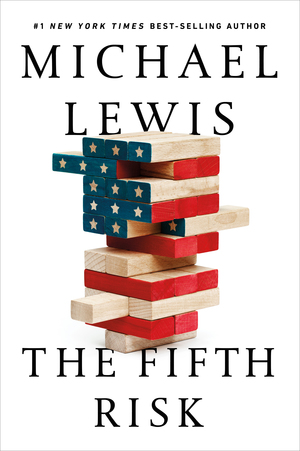Book Review: “The Fifth Risk” — No Citizens, Only Consumers
Whether through disregard, willful ignorance, or strategic elimination, Michael Lewis gives us a glimpse of how parts of the government are being hollowed out.
The Fifth Risk by Michael Lewis. Norton, 256 pages. $26.95.
By Monica Hileman

The Fifth Risk sounds like it might be an apocalyptic thriller starring Bruce Willis. It is a scary book. Oh, that it were fiction. Michael Lewis (Moneyball, The Big Short) is an author driven by curiosity who takes us along as he looks for answers to questions we might not have thought to ask. This time out he delves into the current workings of the federal government in order to answer this elemental question: What if the incoming administration heads failed to show up to be trained for their new jobs? They manage two million or so federal employees, in various departments, who work to maintain basic standards that Americans take for granted.
In order to understand just how disastrous it would be without dedicated people, well-versed in the tasks they oversee, Lewis explores the nature of those tasks. In The Fifth Risk, we meet a few former administrators, intelligent, highly qualified people who understand (and care about) the real effects government policies have on people’s lives. Whether it is protecting us from airborne illnesses, radioactive contamination, terrorist attacks, or hurricanes, their efforts often revolve around keeping us safe. The ‘fifth risk’ of the title is the danger that’s not predictable — and for that reason it may be the most dangerous.
Lewis’ special talent is to show us where Big Ideas intersect with everyday life, a connection made here by the people he interviews. People such as Kevin Concannon, who was once in charge of the US Department of Agriculture’s food stamp and school lunch program. A member of a large, working-class family, Concannon had a brother who suffered from schizophrenia; the help the family received from the Veteran’s Administration later drew him to public service. Under President Obama, the school lunch program’s nutritional requirements were improved (standards which are now, under pressure from lobbyists, being rolled back).
Given the number of wild fires in recent years, perhaps the most attention-grabbing work the government does is that of the Forestry Service, part of the US Department of Agriculture. The USDA also does research to improve milk and crop production, meat inspection, and is credited with preventing a catastrophic outbreak of bird flu in 2015.
Rural Development is also a part of the USDA. It gives (Gave? It seems to have been eliminated from the government’s organizational chart) loans and grants to small town projects. Emblematic of the federal government’s problem is the reluctance recipients have in acknowledging that aid. One former USDA employee confesses that it was not uncommon for a small town mayor to request that the government’s name not appear on the big ceremonial check. Government agencies do not advertise their considerable accomplishments: that is unfortunate, for the American public and for the people who work at these agencies. Ultimately, it degrades respect for public service. One of the book’s most insightful observations comes from Kathy Sullivan, formerly employed at the National Oceanic and Atmospheric Association: “The sense of identity as Citizen has been replaced by Consumer.” There is a “profound ignorance” about what government does, and a lack of involvement that inevitably follows.
The Commerce Department, Lewis is advised, has little to do with actual commerce. A better name for it would be the Department of Information and Technology. Before the computer, all the data the government amassed could not be systematically broken down or analyzed. Now we can more easily track income disparities, traffic fatalities, and crime statistics. It is where America’s opioid epidemic was discovered and then publicized.

Author Michael Lewis — he has written a very scary book. Photo: Twitter.
All the weather forecasts we consult daily are based on the National Weather Service, whose data depends on citizen volunteers, weather balloons, buoys, ships at sea, and satellites. A particularly satisfying part of Lewis’ book is his exploration of how the data is put together to make forecasts. As the name implies, the National Weather Service (under the National Oceanic and Atmospheric Administration) is a government resource. Imagine if it was privatized. Imagine if it was privatized. Barry Myers, the CEO of AccuWeather, once enlisted the help of then Sen Rick Santorum in an attempt to essentially do just that. AccuWeather is a business that charges for its repackaging of National Weather Service information. Myers is Trump’s pick to head NOAA.
The Department of Energy is now headed by former Texas governor Rick Perry. During one of the Republican presidential primary debates he famously pledged to do away with this very Department, but couldn’t remember its name (“The third agency of government I would do away with ….ahh…”) Created in the late ‘70s as a response to the Arab oil embargo (as a means to develop alternative energy), the DOE also became charged with overseeing nuclear weapons, protecting us from radioactive materials and inspecting nuclear waste facilities, like the one along the Columbia River in Washington state. Lewis visits that site and sees 177 tanks the size of four-story apartment buildings that are not all as intact as we would like them to be.
Whether through disregard, willful ignorance, or strategic elimination, Lewis gives us a glimpse of how parts of the government are being hollowed out. The risk he runs in making arcane knowledge comprehensible (credit default swaps, anyone?) is getting too breezy or colloquial while dealing with serious subjects. The Fifth Risk is a timely book and feels a bit rushed to the presses (an index would have been helpful). Mostly it is fascinating, illuminating, at times jaw-dropping, and full of things we should know about.
Monica Hileman’s stories have appeared in journals such as Arts & Letters, The Baffler, the Chicago Tribune’s Printers Row Journal, Catamaran, and Flyway. Another is forthcoming in Anomaly.
